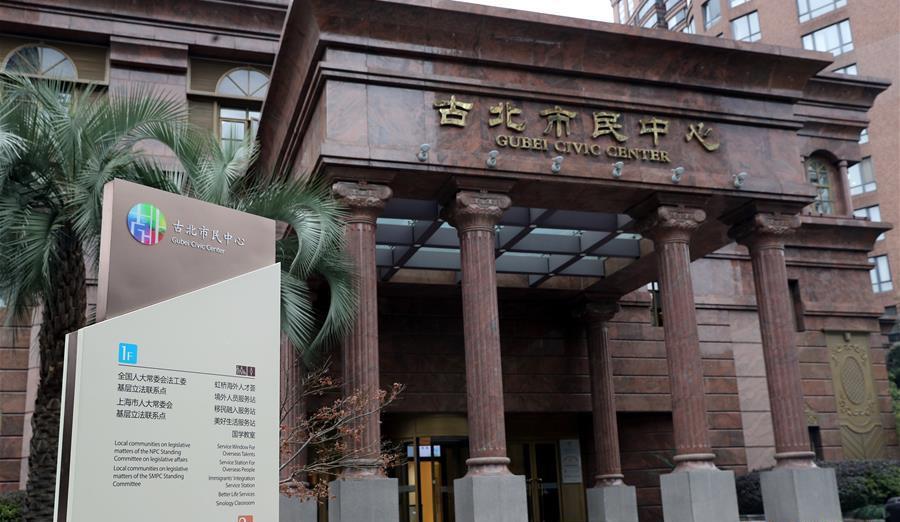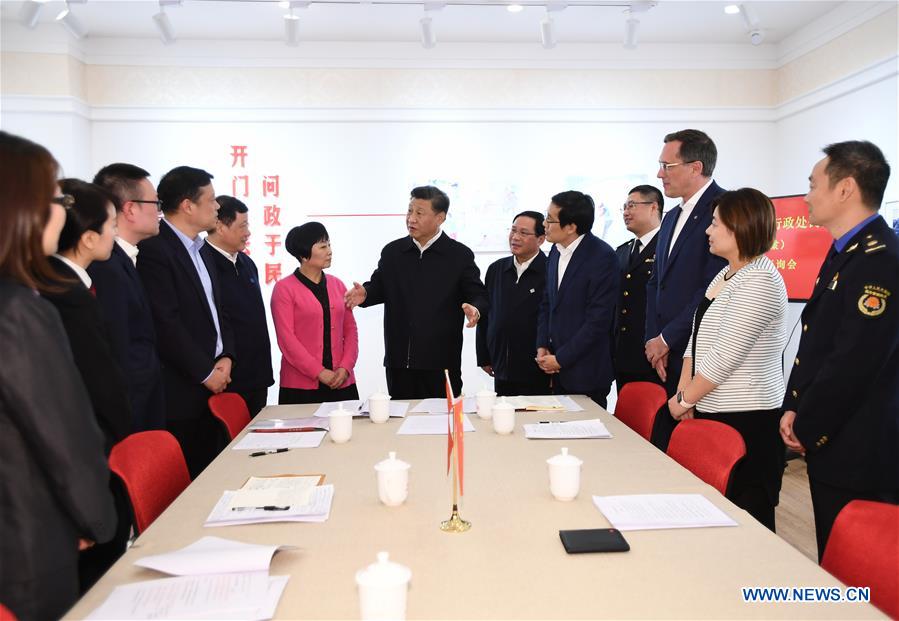
The Gubei civic center in Hongqiao subdistrict, Changning District of Shanghai. /Xinhua
The Gubei civic center in Hongqiao subdistrict, Changning District of Shanghai. /Xinhua
Last year, Li Junhao, a high-school senior in Shanghai, raised a suggestion to prevent domestic violence against minors when his local civic center consulted residents on the amendments to China's Law on the Protection of Minors.
The Gubei civic center of Shanghai's Hongqiao subdistrict later received a thank-you letter from the Legislative Affairs Commission of the Standing Committee of the National People's Congress (NPC). The revised law has adopted Li's suggestion that guardians of minors should be educated rather than punished financially in the case of domestic violence.
"I am so excited and proud that one of our suggestions has been taken up. It is an experience of a lifetime," Li said.
At the civic center, a watercolor painting of a rainbow bridge – the literal meaning of Hongqiao – extending into the Hall of the People in Beijing illustrates the democratic decision-making from the community level all the way to the highest organ of state power.
Residents from all walks of life, from high schoolers to retired pensioners, have been getting involved in China's lawmaking process since 2015, when their neighborhood was designated a grassroots-level legislation contact point for China's top legislature.
In the past six years, the contact point has heard input from residents on 55 draft laws, put forward 1,001 proposals, among which 92 have been adopted into laws.
The Civic Code, which took effect on January 1, 2021, drew the most proposals from the community, and the Individual Income Tax Law considered a suggestion from foreign residents, according to the civic center.
The method has effectively improved the quality of legislation, said Sun Zhenping, a senior official from the Legislative Affairs Commission of the Standing Committee of NPC.
The commission will consult with residents at local level through the contact points before drawing up its annual and five-year plans, Sun said. It will then follow up on the enforcement of new laws, identify problems and collect suggestions on future improvements, thus integrating public consultation into every step of lawmaking.
It is a successful experiment of China's whole-process democracy, Sun noted.

Chinese President Xi Jinping visits the Gubei civic center where a consultation meeting on a draft law was held in Changning District of Shanghai, east China, November 2, 2019. /Xinhua
Chinese President Xi Jinping visits the Gubei civic center where a consultation meeting on a draft law was held in Changning District of Shanghai, east China, November 2, 2019. /Xinhua
The Shanghai neighborhood has come to epitomize the country's whole-process democracy following a visit by Chinese President Xi Jinping in November 2019, when he coined the term for the first time.
"We're marching on a political development road of socialism with Chinese characteristics, and our people's democracy is a whole-process democracy," Xi said during a consultation meeting at the Gubei civic center.
This month, addressing a central conference on work related to the people's congresses in Beijing, Xi reiterated the importance of the people's full participation in the country's democratic process and governance.
"The whole-process people's democracy in China not only has a complete set of institutions and procedures, but also full participation and practices. It is the broadest, most genuine, and most effective socialist democracy," Xi said.
Having witnessed the growing participation at Hongqiao grassroots-level legislation contact point firsthand, Zhu Guoping, a deputy to the 13th NPC, said that lawmaking has truly come to people's doorsteps.
"This is what we mean when we say 'the people are masters of the country'," Zhu said.
In Shanghai, 25 grassroots-level legislation contact points have been established to cover all 16 districts in the city. Together they have submitted more than 6,500 suggestions for 20 pieces of national legislations and 64 local ones. Among these, 530 have been adopted.

